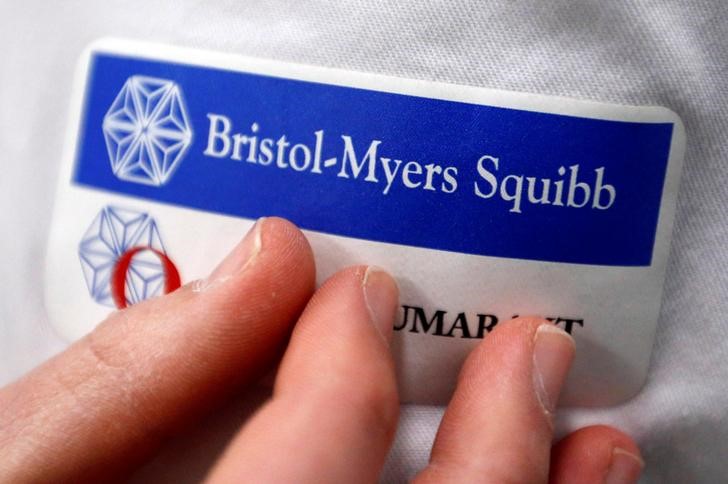In the highly competitive and fast-paced biopharmaceutical industry, Bristol-Myers Squibb (NYSE:BMY) has been a subject of keen interest among analysts. With a history stretching back to 1933 and a focus on cardiovascular, oncology, and immune disorders, the company's strategic moves and pipeline developments are closely watched.
Recent Developments and Analyst Ratings
Bristol-Myers Squibb recently faced challenges with the early termination of the OCEANIC-AF trial for Milvexian, raising questions about its late-stage pipeline and new product potential. Despite this, analysts have maintained a generally stable outlook on the company, with price targets ranging from $51 to $60 and ratings varying from "Equal Weight" to "Market Perform."
Financials and EPS Forecasts
Analysts project a steady EPS for Bristol-Myers Squibb, with estimates for the first fiscal year (FY1) at around $7.64 and the second fiscal year (FY2) at approximately $7.92. These forecasts reflect the company's solid financial performance, even as it navigates the complexities of new product launches and patent expirations.
Product Pipeline and R&D Strengths
Bristol-Myers Squibb's robust R&D engine is highlighted as one of its core strengths. The company has been proactive in its acquisitions, including the strategic purchase of Mirati Therapeutics (NASDAQ:MRTX), which enhances its oncology portfolio with promising treatments like Krazati. However, the commercial success of new products like Camzyos, Sotyktu, Opdualag, Zeposia, Reblozyl, Breyanzi, and Abecma has been hindered by access issues and competition, necessitating a careful navigation of the market.
Competitive Landscape and Market Trends
The company operates in a market that is witnessing significant patent risks and regulatory changes, such as those introduced by the Inflation Reduction Act (IRA). These factors, coupled with the competitive pressures in key therapy areas, have led to a cautious approach by analysts, with concerns over the company's ability to sustain growth amidst these challenges.
Strategic Initiatives and M&A Potential
Bristol-Myers Squibb's strategy has historically involved growth through large mergers and acquisitions. The company's financial strength is seen as a buffer that allows for strategic investments, such as the acquisition of Mirati Therapeutics. However, the effectiveness of this approach in driving long-term growth remains a point of debate among analysts.
Bear Case
Is Bristol-Myers Squibb's pipeline strong enough to offset patent cliffs?
Analysts express concern over the company's ability to launch new products successfully and sustain growth in the face of significant patent expirations. The reliance on M&A to drive growth has been questioned, especially given the challenges faced by new product launches and the potential impact of the IRA.
How will halted trials affect Bristol-Myers Squibb's future?
The early termination of the OCEANIC-AF trial has cast doubt on the prospects of the company's Factor XIa inhibitor trial and its late-stage pipeline. This poses a risk to investor confidence, with the success of upcoming trials becoming even more crucial for the company's valuation.
Bull Case
Can Bristol-Myers Squibb capitalize on its positive industry view?
Despite the challenges, Bristol-Myers Squibb benefits from a positive industry view, indicating potential sector growth. Analysts note that the company is trading at a low P/E multiple relative to its peers, which could suggest undervaluation and an opportunity for growth, particularly if new product launches outperform expectations.
Will strategic acquisitions bolster Bristol-Myers Squibb's growth?
The acquisition of Mirati Therapeutics and the potential of Krazati to lead its class offer optimism for the company's oncology portfolio. If strategic initiatives by the new CEO drive EPS growth and M&A activities alter growth prospects, the company's outlook could improve significantly.
SWOT Analysis
Strengths:
- Strong R&D capabilities with promising development-stage products.
- Stable cash flows from established business segments.
Weaknesses:
- Patent expirations and regulatory headwinds affecting key revenue drivers.
- Slower than expected uptake of new products.
Opportunities:
- Potential for significant growth from new product launches if successful.
- Acquisitions that could enhance the product portfolio and drive sales.
Threats:
- Competitive pressures in key therapy areas.
- Investor skepticism regarding the company's growth strategy through M&A.
Analysts Targets
- Barclays Capital Inc.: Market Perform, $51.00, November 20, 2023.
- Cantor Fitzgerald: Neutral, $55.00, November 15, 2023.
- BMO Capital Markets: Market Perform, $60.00, November 20, 2023.
- Berenberg: Hold, $60.00, November 2, 2023.
The analysis spans from October to November 2023, providing an up-to-date picture of Bristol-Myers Squibb's financial health and market position.
InvestingPro Insights
As analysts and investors weigh the future prospects of Bristol-Myers Squibb, the company's financial health remains a critical factor. According to recent data from InvestingPro, Bristol-Myers Squibb boasts a market capitalization of $104.4 billion, underscoring its significant presence in the biopharmaceutical industry. The company's P/E ratio, a measure of its current share price relative to its per-share earnings, stands at 12.91, suggesting a potentially attractive valuation when considering its earnings power. Adjusting for the last twelve months as of Q3 2023, the P/E ratio tightens to 11.3, further reflecting the company's earnings resilience.
An InvestingPro Tip highlights that Bristol-Myers Squibb is trading at a low P/E ratio relative to near-term earnings growth, which could signal an undervalued stock to potential investors. This is particularly relevant as the company's management has been aggressively buying back shares, a move that often reflects confidence in the company's value and future performance. Additionally, the company's dividend yield as of the end of 2023 was 4.68%, which is notable considering Bristol-Myers Squibb has maintained dividend payments for 53 consecutive years, a testament to its financial stability and commitment to shareholder returns.
These insights into Bristol-Myers Squibb's financial metrics and strategic moves, such as share buybacks and consistent dividend payments, provide a more nuanced understanding of the company's position in the competitive biopharmaceutical landscape. With a total of 12 additional InvestingPro Tips listed for Bristol-Myers Squibb, investors have a wealth of considerations to factor into their analysis.
For a deeper dive into Bristol-Myers Squibb's financials and strategic outlook, readers can explore further InvestingPro Tips at https://www.investing.com/pro/BMY.
This article was generated with the support of AI and reviewed by an editor. For more information see our T&C.
